Independence. Inclusivity. Innovation.
Your generous support makes all this possible. And more.
You accelerate groundbreaking research
. Thanks to you, we can explore new ideas, conduct pilot studies, and gather the data to transform the care, outcomes, and employment opportunities for people with neurological disabilities and developmental disorders. Your impact on adults and children with traumatic brain injury, spinal cord injury, stroke, MS, and autism is life-changing.
Your gift keeps giving. For every dollar of support from our donors over the past three years, our researchers secured two dollars and thirty-three cents in additional funding for their vital work – in effect, more than doubling the difference you make.
We call this the impact of one. Just as one droplet of water has a ripple effect, so do you. Whether championing our pioneering research, advancing postdoctoral training, or charting new pathways to employment, your impact is felt every day across Kessler Foundation and beyond.
We are profoundly grateful for your support and the difference you make in improving the lives of people with disabilities.
On behalf of Kessler Foundation, our sincere thanks.
Rodger DeRose President and CEO Michele Pignatello Vice President and Chief Development Officer
Michele Pignatello Vice President and Chief Development Officer





empowerevery
Engaging our communities brings critical perspective to rehabilitation research.



who understands the challenges of living with a disability better than those who face them every day? Their lived experience makes people with disabilities a most valuable and vital partner in rehabilitation research. Their insights into the physical, functional, and cognitive issues that accompany spinal cord injury, brain injury, neurological conditions, including multiple sclerosis, and autism, help Kessler Foundation researchers formulate, redefine, or expand the scope of studies.
Researchers, like Dr. Helen Genova, listen to and act on the community’s experience.
“Part of our responsibility as researchers is to listen, learn from, and respect our constituents’ perspective. With their input, we gain a greater

understanding of the issues at hand, enabling us to better identify meaningful, practical interventions that foster independence and improve the quality of life for these communities,” says Trevor Dyson-Hudson, MD, director, Center for Spinal Cord Injury Research at Kessler Foundation.
While study participants and support group members often express their thoughts, a more formal process is in place to ensure that the voices of our communities are heard. Thanks to your support, Consumer Advisory Boards have been established across several research areas to engage diverse groups of those with disabilities in meaningful and often enlightening discussions on a regular basis.
“What we gain from our board members is immense… immeasurable. They openly share what’s important to them,” says Nancy Chiaravalloti, PhD, director of the Centers for Neuropsychology and Neuroscience Research and Traumatic Brain Injury Research, adding, “Their perspective frequently contributes to new or different avenues of research.”
Helen Genova, PhD, associate director of the Foundation’s Center for Autism Research, concurs. “Research doesn’t exist in a vacuum, nor can it succeed without a true partnership with those whose lives will ultimately be impacted by our work. Thanks to our ‘consumer consultants’ and the unwavering support of our donors, meaningful change is possible.”
Nadine Wright-Arbubakrr, whose son Nassan is on the autism spectrum, experienced first-hand the lack of accessible, affordable resources in her community. In response, she founded Nassan’s Place, an educational and recreational program based in Newark, NJ, to assist families like hers. More recently, she joined the Consumer Advisory Board at Kessler Foundation’s Center for Autism Research, noting, “Through advocacy and research –and with the generous support of the Reitman Foundation and donors like you – we’re increasing awareness, and even starting to examine the socioeconomic factors that further impact children with autism in underserved communities. The resulting interventions could be transformative.”

Your support helps Nadine and Nassan change the status quo.
“ Community perspectives contribute to new research.”
Dr. Nancy Chiaravalloti
Postdoctoral fellowships create a framework for achievement in rehabilitation research.
am often asked about the most gratifying aspects of my work,” says John DeLuca, PhD, senior vice president, research and training at Kessler Foundation, “and one of them is mentoring the next wave of research scientists. Each of our postdoctoral fellows brings their own interests, intentions, and experience to the program. It is our responsibility as mentors to guide them and foster their passion for the field of rehabilitation research.”
iEarly in his career, Dr. DeLuca recognized that a pool of highly trained scientists was needed to expand the field. He worked to formally establish a research department at Kessler Foundation and initially secured funding for three postdoctoral candidates.

The rest, of course, is history. Today, in collaboration with the Department of Physical Medicine and Rehabilitation at Rutgers New Jersey Medical School, and thanks to your support, the program has graduated 126 rehabilitation researchers from 11 countries, many of whom have continued their careers at the Foundation.

The program’s hallmark is its diversity. It draws physicians, physical and occupational therapists, biomedical and biomechanical engineers, and others with advanced medical, clinical, and scientific degrees whose common goal is to improve the outcomes and quality of life for people with disabilities.
Didactic learning, grant writing, hands-on research, and manuscript preparation are all part of this multidisciplinary, two-year mentorship program. “Through the support of our donors, along with grant funding,
knowledge
we provide fellows with an unparalleled educational experience: one that prepares them to become leaders in our field,” notes Dr. DeLuca.
“Whether in research, scientific, or academic settings, I’m proud to say our fellows are making their mark nationally and internationally. This has helped accelerate the growth of all our research programs, further benefiting people with disabilities and positioning Kessler Foundation as the premier rehabilitation research entity of its kind in the world.”
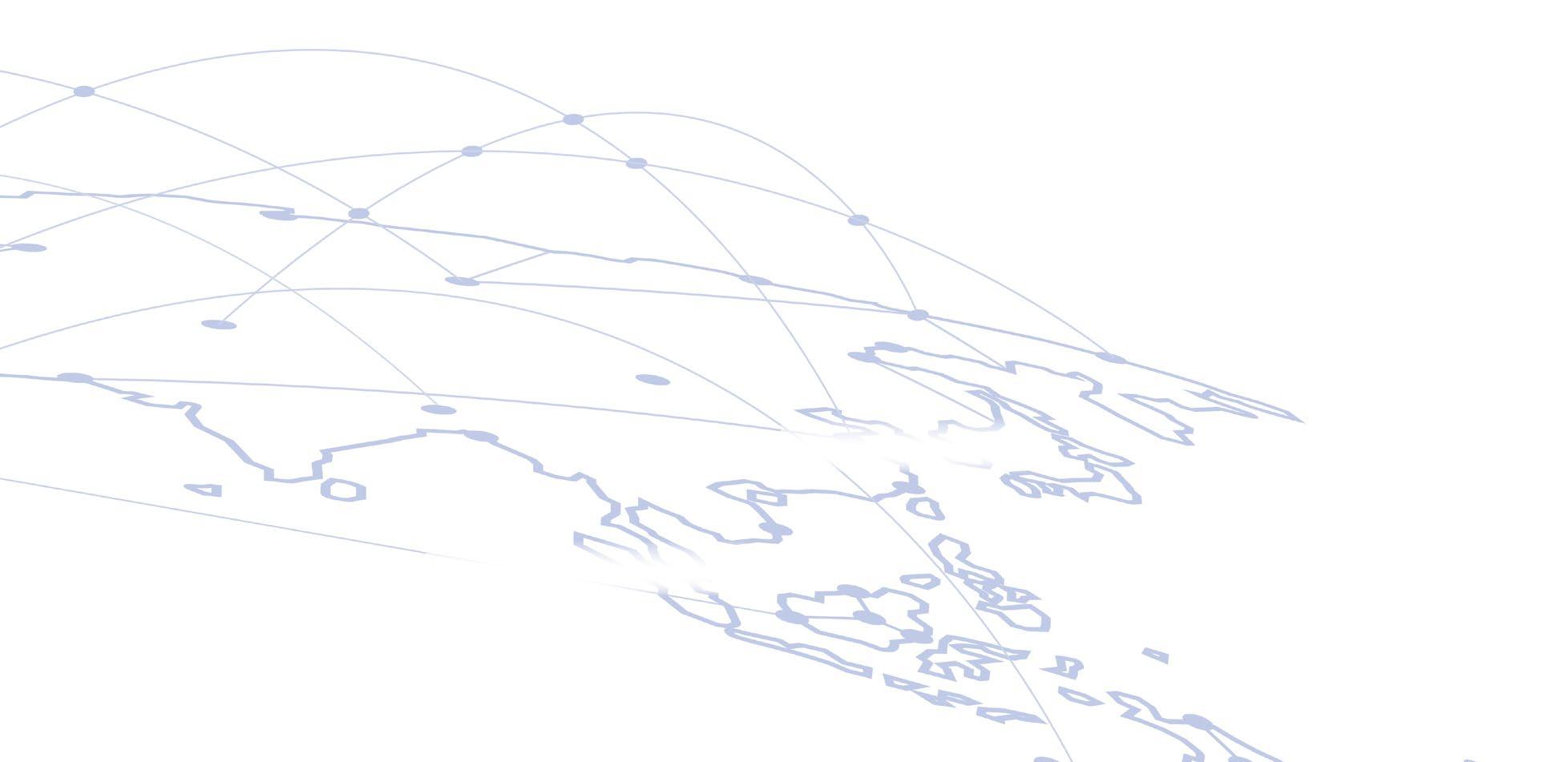
Your support funds the building blocks of learning and creates change.
In research, one discovery invariably leads to another. For Gail Forrest, PhD, director of the Tim and Caroline Reynolds Center for Spinal Cord Stimulation at Kessler Foundation, these systematic building blocks are key in understanding biomechanics – the science of movement –and functional recovery after spinal injury.

“My postdoc fellowship at the Foundation prepared me to build on our ever-increasing knowledge of the spinal cord and its relationship with the brain, motor function, and cardiovascular, respiratory, and other systems, and explore new research frontiers,” says Dr. Forrest.
Dr. Gail Forrest’s fellowship led to innovation in SCI treatment.

In one promising study, a participant who sustained a paralyzing spinal cord injury more than ten years ago demonstrated voluntary movement in his leg following transcutaneous – through the skin – spinal stimulation. Similarly, a participant with very minimal hand and arm function regained purposeful movement, such as grasping and picking up a glass.
“We are encouraged by these early results, and deeply grateful to our donors who share our commitment to pursuing these pioneering interventions.”
care for the
What do families living with spinal cord injury really need? Thanks to you, they’re telling us.
everyone knows that spinal cord injury impacts the individual. But often we forget how it reverberates through an entire family. The impact can be especially hard on family caregivers, who may experience depression, anxiety, poor physical functioning, and resentment.
To date, research has highlighted these challenges but few studies sought input directly from SCI caregivers to better understand their needs. SCI professionals were left with a significant knowledge gap –until now, thanks to support from Lisa and Dan Peterson, the Reitman Foundation and you.

Denise C. Fyffe, PhD, senior research scientist in the Centers for Spinal Cord Injury Research and Outcomes and Assessment Research, and Jeanne M. Zanca, MPT, PhD, assistant director of the Center for Spinal Cord Injury Research, are embarking on a new study to gain knowledge directly from SCI caregivers. The scientists

caregiver
aim to meet with caregivers to explore relationships, socioeconomic factors, geography, and access to care. Once the data are collected and analyzed, findings will be shared with people living with SCI, their loved ones, and SCI professionals, and used to help address the unmet needs of caregivers.
“It’s crucial to give SCI caregivers the chance to voice their experiences,” advises Dr. Zanca. “In the struggle to find answers to a myriad of questions about how best to care for their loved one, the caregiver often feels alone, exhausted, and unsupported. We must learn exactly how to make the burden of care more manageable, so caregivers’ lives are not diminished.”
Lisa Peterson, whose husband, Dan, has lived with SCI since 2019, intimately understands the need for answers. “It wasn’t easy getting used to our life with SCI,” Lisa remembers. “Daily – sometimes hourly – I had to make snap decisions about Dan’s care at home without guidance.”
After receiving excellent care at Kessler Institute for Rehabilitation, Lisa and Dan wanted to give back. They focused their support on SCI research at Kessler Foundation. Based on her own experience, Lisa felt it was critical to address caregiver needs.
“I gained much of my practical knowledge from online SCI support groups and chat rooms. That support also gave me
an inside view of the challenges my caregiver peers experienced,” Lisa says. “When given the opportunity to support the new study, Dan and I didn’t hesitate.”
Dr. Fyffe explains, “Lisa was instrumental in helping shape many focus group questions in our investigation. Her firsthand knowledge of learning to live with SCI is guiding our study.”
Lisa, who joined the Foundation’s Board of Trustees in 2021, recounts, “As I’ve learned more about the breadth and scope of Kessler Foundation research, I am overwhelmed by the considerable talent and unwavering dedication of the staff. I’m proud to support this study to help the SCI community. The results will have a profound impact on people with SCI and their caregivers.”

Your generosity transforms lives through innovative rehabilitation research.

egenerativerehab
ust six years ago, it was merely an idea. Today, the Derfner-Lieberman Laboratory for Regenerative Rehabilitation Research is a global leader in this multidisciplinary field.
Trevor Dyson-Hudson, MD, and Gerard Malanga, MD, recognized the untapped potential in combining regenerative medicine with rehabilitation research and partnered to create the lab. With support from the Derfner Foundation and you, they founded the Derfner-Lieberman Fellowship. Since Dr. Malanga’s untimely passing
in 2022, his colleague, Jay Bowen, DO, joined the team. Nathan Hogaboom, PhD, their first postdoctoral fellow, now plays a pivotal role as lab co-director.
“Gerry advocated passionately for this research, foreseeing how it would transform care,” Dr. Dyson-Hudson recalls. “Lessons learned under his leadership guide us in developing new treatments for relieving pain and restoring function.”
Building on their early success, the team has secured major grants to expand their novel lines of research. They are currently testing the injection of an individual’s own fat tissue as a potential treatment for disabling knee pain caused by meniscus injuries or arthritis.
As Dr. Dyson-Hudson explains, “Many affected individuals, including those in the military, want to avoid knee surgery, so there’s a pressing need for effective, minimally invasive treatments.”
The team is also exploring the potential benefits of extracorporeal shockwave therapy (ESWT), a noninvasive treatment that uses highintensity sound waves to stimulate healing. Marwa Amer, MD, PhD, the newest Derfner-Lieberman fellow, is testing ESWT for knee pain in a study funded by the Derfner Foundation. Meanwhile, Dr. Hogaboom is studying whether ESWT can alleviate spasticity, a painful complication of spinal cord injury that restricts movement.

“ESWT may offer an alternative way to treat these disabling conditions, avoiding the side effects of current drug treatments,” Dr. Hogaboom notes.

The Derfner-Lieberman Lab’s remarkable progress shows how passion, collaboration, and innovation can transform rehabilitative care.
“Partnering with the lab’s scientists has been most rewarding,” says Jay Lieberman, Derfner Foundation Trustee. “To fulfill Dr. Malanga’s vision, they are rethinking the approach to musculoskeletal conditions, one of the most common causes of disabilities. Their success will change lives.”
The team’s accomplishments are impressive, but the real impact is illustrated by Joe Monteforte’s amazing story of recovery.
oe’s remarkable journey.
A wheelchair user with spinal cord injury and debilitating shoulder pain, Joe Monteforte faced the prospect of shoulder surgery in 2017, with its long recovery and risk of complications.
Then Joe took part in the Derfner-Lieberman Lab’s first pilot study. His pain was relieved after a single injection of his own fat tissue into his shoulder joint – a procedure called autologous micro-fragmented adipose tissue (MFAT) injection.
Five years later, Joe is still pain-free, leading an active lifestyle including daily workouts and long outings beside his wife, an avid race walker. “I use a state-ofthe-art workout facility with the newest machines,” says Joe, “so I’ve been able to intensify my exercise regimen. I’m stronger than I’ve ever been.”

Thanks to you, Beth’s back on the ball.
Beth Holcomb has lived with multiple sclerosis for nearly twenty years. “Symptoms come and go, but fatigue remains,” explains Beth. “I’m a fulltime pre-school teacher. I love my job, but after five days of being on my feet and keeping up with the kids, I often have no energy left. I was considering scaling back my hours.”
But then she joined Kessler Foundation’s study on the effect of aerobic walking on brain processing speed, mobility, and quality of life for people with MS. She was curious to see if this exercise would help.
It did. After completing the regimen, Beth found her stamina had increased. “Now I can continue full-time work with energy left to enjoy being with my family and friends, and even go bowling,” she says.

“This research is essential to improving quality of life for people like me.”
health experts agree, regular exercise can work wonders for our bodies and minds, improving mobility, lessening fatigue, and boosting mood. With a recent grant from the Dean Janeway Endowment Fund at New Jersey Health Foundation and support from donors like you, a new Kessler Foundation pilot study aims to determine whether home-based, aerobic walking exercise can reverse cognitive impairment caused by multiple sclerosis and deliver additional health benefits. Brian M. Sandroff, PhD, senior research scientist in the Center for Neuropsychology and Neuroscience Research, leads the investigation.
This novel, randomized control trial builds on the Foundation’s 13 years of exercise research. Dr. Sandroff’s team will examine 12 months of home-based, remotely delivered and supported exercises, comparing high-frequency/ high-intensity aerobic walking to mild-tomoderate walking that parallels the
current standard-of-care exercise often prescribed for MS patients.
“I believe this study will provide meaningful insight into developing aerobic exercise guidelines for specifically managing MS-related cognitive impairment at home and in the community,” says Dr. Sandroff. “We are hopeful that this pilot study sets the stage for the broad-scale consideration of aerobic walking exercise training for restoring cognitive functioning not improved by MS disease-modifying drugs. It may also answer the oftenasked question, ‘Does the amount or intensity of walking exercise matter?’”
If successful, this study may provide major benefits to individuals with MS. All participants should experience a general health boost, including improvements in fitness and mobility, along with a reduction in fatigue and depressive symptoms. Participants randomly assigned to the highfrequency/high-intensity group might
For people with MS, your support is a real game-changer.
walking through MS
realize additional gains in processing speed, brain volume and connectivity, and quality of life.
Your support helps sustain and expand the work of our scientists and the potential to positively impact the lives of people with MS.
Dr. Sandroff hopes this latest endeavor will lead to a large, federally funded, multi-site trial with participants from across the US.
More than a decade of Kessler Foundation exercise research drives this latest study.

“Thanks to the Dean Janeway Endowment Fund and donors like you, we’re able to take this first, all-important step in creating actual guidelines for aerobic walking that clinicians can prescribe to their MS patients across the globe.”
“ Imagine a world where people with MS self-manage their cognitive impairments at home.”
Dr. Brian Sandroff
78%
jobgrowth
more than doubled arrangements
In 2022, supervisors prioritized hiring and recruiting individuals with disabilities more than they did in 2017. established or changed their accommodations provisions 2x
as many organizations have centralized accommodations funds to cover modifications for employees with disabilities
Your support opens doors all over NYC…

Will the post-pandemic surge continue?
With your help, we gathered some promising stats.
the past few years have been a remarkable and historic time for the employment of people with disabilities – and the world is taking notice. Remote work became increasingly accepted, a labor shortage hit the country, new accommodations policies were implemented, and employment for people with disabilities mushroomed. Your support enabled
us to gather data on these important frontline trends. A 2022 employment and disability survey conducted by Kessler Foundation and the University of New Hampshire compared data from a similar survey conducted in 2017, providing a critical timeline analysis of the pre-pandemic, pandemic lockdown, and pandemic recovery periods. Our researchers captured changes in the processes and practices employers use to recruit, hire, train, accommodate, and retain people with disabilities, as well as differences in the attitudes and commitment of supervisors and upper management.
“Today, more companies are partnering with disability organizations in their recruitment efforts,” says survey co-author John O’Neill, PhD, director, Center for Employment and Disability Research, Kessler Foundation. “And more are using outside assistance for onboarding workers with disabilities, adopting training on disability issues and cultural competence, and reaching out to government and local resources to learn more about providing accommodations,” he concludes.
These surveys garnered national coverage from top-tier media including The Wall Street Journal, Bloomberg, and the LA Times. Your support raises awareness of the importance of expanding employment opportunities for people with disabilities.
In 2017, funding provided by Kessler Foundation and donors like you breathed life into NYC: ATWORK, a small-but-mighty disability employment project that supported 1,300 people with disabilities in their job search. n Six years later, the unmitigated success of NYC: ATWORK has led New York City to revamp its entire workforce development infrastructure to create an inclusive one-stop shop for job seekers of all abilities. n “We are identifying resources needed and training individuals throughout the city so people with disabilities will be able to go anywhere across the five boroughs to prepare for and connect to jobs,” says Martha Jackson, assistant commissioner, Mayor’s Office for People with Disabilities. “By integrating disability employment services into the wider workforce landscape, we can move thousands more New Yorkers with disabilities into employment.” n All of this progress would not have been possible without the generosity of donors like you. Your support is helping to create a more diverse and inclusive workforce, and that is a gift that will keep on giving.
kessler Foundation’s 2022 Stroll ’N Roll, presented by Pfizer and Impossible Dream, was a record setter. People of all ages and abilities gathered in Verona Park, NJ, and in their own neighborhoods to prove that abilities are what matter. Together, we raised more than $220,000 – the most ever –to advance rehabilitation research and employment for people with disabilities. The generosity of people like you made this happen! Inspiring leaders created teams of champions to give back and make a lasting impact. Our dedicated Stroll ’N Roll committee reached out to friends and family to make the event a success.

Join us this year on Sunday, September 24, from 11 AM to 2 PM. To learn more, scan the code or visit KesslerFoundation.org/SNR
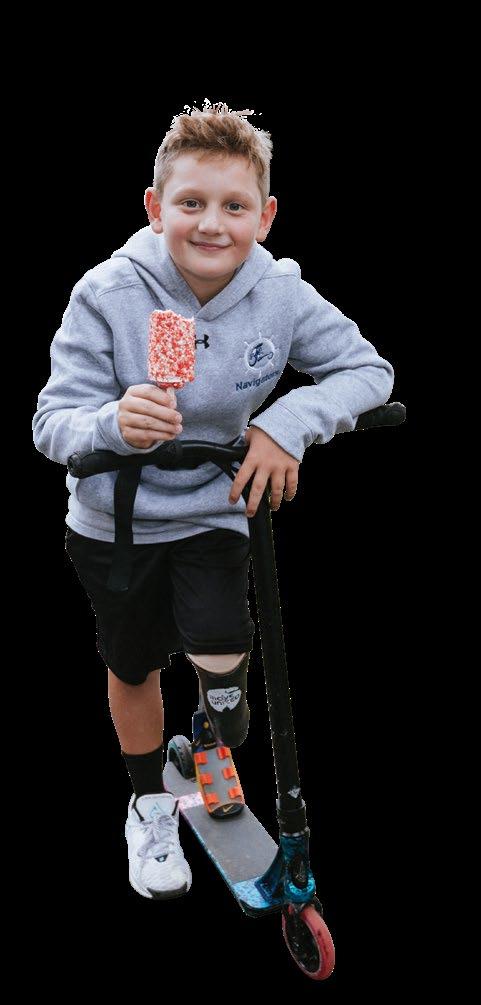
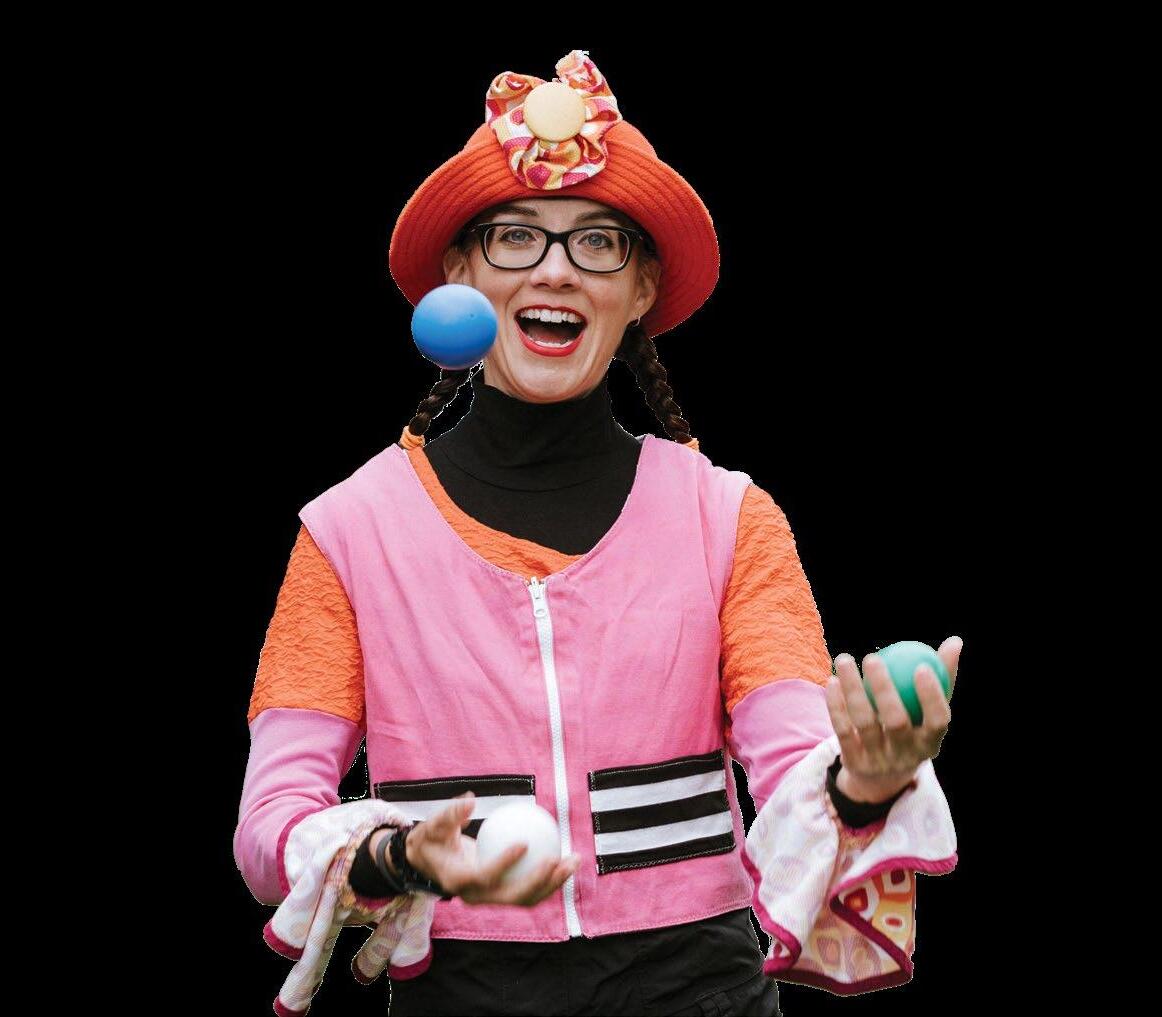










your support changes
as a Kessler Society member, you champion groundbreaking rehabilitation research and employment for people with disabilities. Because of your generosity, people gain so much: restored mobility, improved thinking, learning and memory, and meaningful jobs and careers.
Kessler Society members continue the legacy of Henry H. Kessler, MD, PhD, who founded Kessler Institute for Rehabilitation after serving in World War II. His vision was “…to treat the whole individual…to help people successfully regain physical, mental, social, vocational, and economic usefulness to the fullest possible degree.”

Membership in the Kessler Society is extended to friends who make annual gifts totaling $500 or more. We're proud to recognize these individuals, families, and organizations in our 2022 roster. Thank you for your shared vision and commitment.
Champions
$100,000+
The Derfner Foundation
The Howard S. and Deborah Jonas Foundation
Joseph and Cheryl Marino Family Foundation
Tim and Caroline Reynolds Trimech
VIA Institute on Character
Wallerstein Foundation for Geriatric Life Improvement
Anonymous
“ Rehabilitation is the precious gift of hope translated into action.”
Dr. Henry H. Kessler
lives
Ambassadors
$25,000-$99,999
The Carson Family Charitable Trust
Residuary Trust FBO James Cino
Dr. and Mrs. A. R. Giaquinto
Terri and Michael Goldberg
The Healthcare Foundation of New Jersey
Dean Janeway Endowment Fund at New Jersey Health Foundation
David Legow and Sarit Catz
Stuart and Leslie Milsten
Morgan Stanley
Noreen and Richard Oelkers
Alfiero and Lucia Palestroni Foundation
Lisa J. Peterson and Daniel J. Peterson
Pfizer
Pureland Dzogchen Buddhism Society
Estate of Frank Rea, Jr.
Reitman Foundation
Richard and Linda Ritholz
The Charles and Ann Serraino Foundation
Joanne Serraino
Wakefern Food Corporation
Anonymous
Benefactors
$10,000-$24,999
The Walter Henry Freygang Foundation
Gibbons P.C.
Pastora C. Goldner
Estate of Jerome Lowengrub
Liz and David Lowenstein
Deborah Mellen
Pfizer Foundation
Glenn M. and Marilyn B. Reiter
Lindsey and Tyler Rhoten
Marion and Michael Saffer
Ellen Salsburg
Erin and David Schonbraun
Henry and Mary Stifel
Susan and Stephen Sudovar
Anonymous
Patrons
$5,000-$9,999
Laurance S. Aronson
Myrna and Leonard Comerchero / Selma T. and Jacques H. Mitrani Foundation
Crewcial Partners
Ellen and Rodger DeRose
Ekso Bionics
Ellen and John Germain
The William A. Hagan, Jr. Foundation
Alyce C. Halchak, Esq.
MaryAnn and Dean Janeway
Kessler Institute for Rehabilitation
Dr. Ruth G. Legow and Mr. Gerald C. Legow

Michelle and David Margolis
Diane and Nicholas Masucci
Mary Anne McDonald, Esq. and Joseph F. Benning
Mary Rose Migliazza and Carl Guzzo
Novartis Corporation
The Philip W. Riskin Charitable Foundation
Andrew Rubenstein
William Rubenstein
Lyn Rosensweig and Bruce Schnelwar
Saul M. Simon
Susan and Guy Tufo
Mary Lou and C. William Weisser
Sponsors $1,000-$4,999
Anne and Victor Ammons
Henry and Diana Asher
John Bae
Ballem Family Foundation
Martin Barber
Kerry A. Barringer and Rosetta Arrigo
Doug and Lynn Borck
Bristol-Myers Squibb Company
Bristol-Myers Squibb Foundation
Matching Gift Program
Mr. and Mrs. John R. Cannell
Charity Clients of The Giving Block, Renaissance Charitable
Nancy and Nicholas Chiaravalloti
Cooperman Barnabas Medical Center
The Cormac Group
Francine and Michael Davis
Dr. John DeLuca and Mrs. Carmen Fritsche DeLuca
Timothy Dineen
Trevor Dyson-Hudson, MD
Will and Ann Eisner Family Foundation
Elberon Development Group
James Elliot
Feinstein Raiss Kelin Booker and Goldstein LLC
Paul Ford and Nancy Young
Fox Rothschild LLP
Arthur J. Gallagher and Co.
Jennifer and Andrew Gandolfo
Dr. and Mrs. Bruce M. Gans
Alan and Marion Garfield
Diane and Saverio Garruto
Cherie Giraud
Global Charitable
Debra and Robert Goodman
Nancy and Carl Gropper
Jen and Michael Halchak
Barbara Herbert
Heather and Michael Herz
Bob and Louise Herz
Homewatch CareGivers
Dana and Peter Hopper
The Horizon Foundation for New Jersey
Linda D. Howard
Integra Foundation
Investors Foundation
Ipsen Biopharmaceuticals
Meg and Howard Jacobs
Jewish Vocational Service of MetroWest
Selim Kaplan
Elaine and Dan Katz
Mary Kennon
Steven Kirshblum, MD and Anna Kirshblum
Mr. and Mrs. Robert A. Kleinert
Kathryn Knott
Karin and John Kukral
Nancy and John O. Lasser
Peter Lasser and Cynthia Potter
Lincoln Financial Foundation
Mrs. Tobey Lipschitz
Margarita and Castor Losada
Macquarie Group
Mandelbaum Barrett, PC
The Margetts Foundation / Donna and Tom Margetts
Marsh McLennan
Eleonore and Russell McCabe
Rita Menz
Mightycause Charitable Foundation
The Miller Family Endowment
Wendy and Nikhil Minocha
NK Architects
Northeast Capital Group
Numotion Foundation
Karen Olson
John H. O’Neill, PhD and Suzy O’Neill
Petry Engineering LLC
Michele Pignatello and Daniel Cordasco
Carol and Mark Pollard
Jane Powell
Lynne and M. John Richard
Rizon Labs
Randi and Rob Rudnick
Sara-Ann and Robert Sanders
Stephanie and Warren Spar
Seth R. Stoller, MD
Jane and Leopold Swergold
TD Bank
Richard Travia
Kevin Trocciola
The Wawa Foundation
Bobby Windham, Jr.
Withum
Anonymous (3)
Members
$500-$999
AmazonSmile Foundation
Patricia E. Bader
Bank of New York Mellon
Michael Bennis
Jacqueline Blakeley
Cassandra and Scott Bollinger
Peter J. Bondy
Mary Ann Brigante, RN, CRRN
Doris C. Brown and Leonard R. Davis
B-Temia
Janine Carver Leffers
Tracy R. Cate
Michael J. Crowley Memorial
Cushman and Wakefield
Steven Diamond
Margi Douglas
James K. Estabrook, Esq.
Joseph Falkenstein
Amy Farr
Valerie Fraser
Alexander Garbutt
Helen M. Genova, PhD and Matthew E. Giangrante, MD
Samantha Good and Darren Lumbard
Amy and Jeffrey Halper
Pat Hargrave
Martin and Dawn Harrison
David Jarvis
Neil Jasey, MD
Johnson and Johnson Foundation
Matching Gifts Program
Punam and Satish Kashyap
Jane and Andy Kessler
Sue Kida PT, MHA
Walter and Debbie Kneis
Ravi Kumar
Janelle Lavoie
Blanche Lerner
Dr. and Mrs. Todd A. Linsenmeyer
Eric and Meg Malmborg
Patricia and Winslow Marston
Bernadette and Michael Miller
Samuel Molesworth
Barbara Muroff
Robert P. Nielsen
Shelby Nielsen
NJM Insurance Group
William J. and Dorothy K. O’Neill Foundation
Catherine and Vincent Pignatello
Gwendolyn Ponder
Premio Foods
PSEG
Gabe Redler
Barbara Reynolds
Susan and Richard Sandler
Donald N. Schatz
Dave Singh
Dr. and Mrs. Richard A. Stall
Virginia and Carl Sulzberger
Owen M. Toolen III
Christy Wu
Glenn Wylie, DPhil
Dr. Guang Yue and Mrs. Nancy Yue
Margaret and Paul Zeuner
Anonymous
Matching Gift Organizations
In 2022, civic-minded organizations generously matched gifts made by individual donors.
American International Group
Automatic Data Processing
Bank of New York Mellon
Blue Cross Blue Shield of North Carolina
Bristol-Myers Squibb Foundation
Matching Gift Program
CBRE
Gates Family Office
The Horizon Foundation for New Jersey
Johnson and Johnson Foundation
Matching Gifts Program
JLL
Lincoln Financial Group
Lord, Abbett and Co.
Macy’s
Macquarie Group
Novartis Corporation
Novo Nordisk
PSEG
Palo Alto Networks
Pfizer Foundation
Regeneron Pharmaceuticals
Verisk Analytics
Wiley Publishing
William J. and Dorothy K. O’Neill Foundation
Fundraisers
In 2022, inspired leaders raised funds to champion research and employment for people with disabilities.
Abilitech Medical Cares
Alexa Arrabito
Team Center for Autism Research
The Famiy of Alan M. Bader
The Family of Janet Benevento
The Family of Barbara Ann Bogle
The Family of Susan Bondy
Team CMRE - Mobility and Engineering Research 2022
The Kessler Foundation Communicators
Elvira Martinez Condor
Tara Cron
Team CSRR 2022
The Family of Carolyn Damo
Team Development/Recruitment
The Diamond Family, in Memory of Kenneth Richard Diamond
The Family of Michael Scott Gibson
Cherie Giraud, In Memory of Matt and John Giraud
Samantha Good, Team Sam
Rosalie Hannigan, Team Rosalie
The Family of William J. Hannon
Team HR/IT/Finance
Team IRB
Team JVS
Kyle and Tami Kennon
The Family of Rona Lubetkin
Christine Markow, Never Give Up
The Family of Michael McCaffery
The Family of Stephen Middleton
Team NNL/TBI
Chantay Anne Parker
Lisa Peterson
Christina Potter
The Family of Eric M. Redler
Team Reynolds Center for Spinal Stimulation
Team RONIC
Team SCI/O
Ilene Silver
Adam Small
The Family of Patricia Smith
Ilene Kaplan Tamburri
Jessica Verney
Pete and Alison Welch
Kathleen Woeste, Woeste’s Buckeye Brigade
Brian Wolf
The Family of Dale Wooldridge
The Family of André Ycre
Legacy Donors
We are grateful to these friends who have included Kessler Foundation in their estate plans.
John J. Brauss, Jr.
Vincent Comperatore
David Legow
Barbara and Gary Lewis
Kenneth P. Middleton
Deborah Perelmuter
Glenn M. and Marilyn B. Reiter
Joanne and Fred Salzmann
James A. Schmitt
Guy Tufo
Anonymous (2)
Trustees
Michael P. Davis
Rodger L. DeRose
M. John Germain
Terri Goldberg
Alyce Halchak, Esq.
Michael Herz, Esq.
David Legow
David Margolis
Deborah Mellen
Mary Rose Migliazza, Esq.
Lisa Peterson
Michael A. Saffer, Esq.
Ellen Salsburg
Bruce Schnelwar
David Schonbraun
Saul M. Simon
Guy Tufo
C. William Weisser
Diane Zezza
Trustees Emeriti
John R. Cannell, Esq.
Richard C. Fowler, Jr.
Alexander R. Giaquinto
Robert H. Herz
John O. Lasser
Barbara Lewis
Elizabeth Lowenstein
W. Thomas Margetts
Toni Marotta-Brinton
Mary Anne McDonald
Robert W. Parsons, Jr.
Mark L. Pollard
Glenn M. Reiter, Esq.
Wendy M. Richman
Allen J. Sinisgalli
Stephen G. Sudovar
Francis A. Wood, MD
a few
To learn more about the research and inspiring stories that your support makes possible, visit KesslerFoundation.org/giving or scan here:
$25,000
Sponsors one research participant with spinal cord injury in a transcutaneous spinal stimulation study


$15,000
Sponsors one research participant with brain injury, stroke, or MS in a study to restore mobility using a robotic exoskeleton
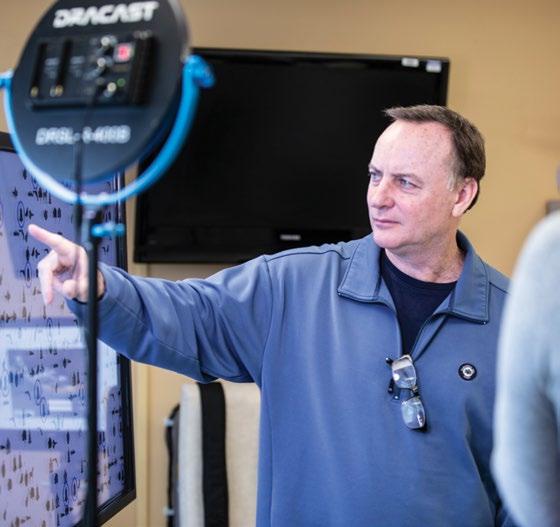

$10,000
Sponsors one research participant in a study exploring new treatments using regenerative rehabilitation
$7,500
Sponsors one research participant with brain injury or MS in a study to improve thinking, learning, and memory
$5,000
Sponsors one research participant in a study to improve quality of life after spinal cord injury

ways every dollar makes a difference
$5,000
Sponsors one research participant in a study to treat hidden disabilities after stroke


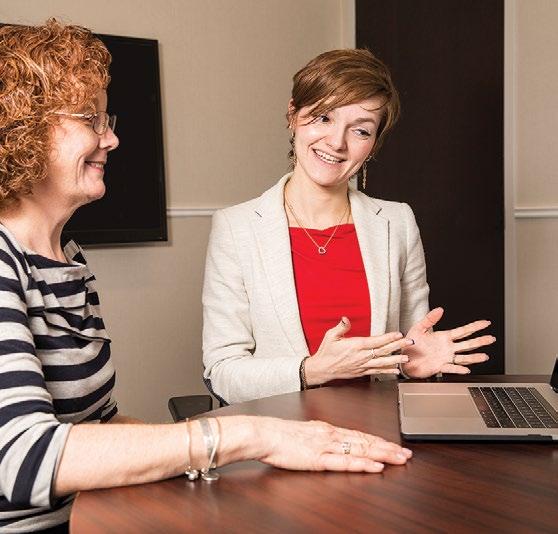


$3,000
Covers the cost of one study’s Institutional Review Board approval, required to protect research participants
$2,500
Underwrites a functional MRI scan and analysis to determine changes in the brain or spinal cord
$1,000
Covers the cost of one study’s Institutional Review Board renewal
$500
Covers the cost of recruiting a research participant
thankyou
120 Eagle Rock Avenue, Suite 100
East Hanover, NJ 07936-3147
tel. 973.324.8430 | fax 973.386.1361
@KesslerFdn | /KesslerFoundation
@KesslerFdn | Kessler Foundation
KesslerFoundation.org
Changing the lives of people with disabilities
